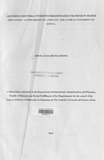| dc.contributor.author | Obura, Elizabeth A | |
| dc.date.accessioned | 2017-11-07T11:42:26Z | |
| dc.date.available | 2017-11-07T11:42:26Z | |
| dc.date.issued | 2016 | |
| dc.identifier.uri | http://hdl.handle.net/11295/101171 | |
| dc.description.abstract | Mentoring, a process of influencing and fostering the intellectual development of students and their career aspirations has long been regarded as an important adjunct to teaching within higher education. Universities heed to the need for lecturers handling doctoral students to be mentors because they look up to these students to serve as lecturers upon completion. Considering the massification of higher education in countries such as Kenya, the need for mentoring in higher education cannot be overemphasized, especially if universities are to remain faithful to their core mission: knowledge generation. It is against this background that this study investigates mentoring of doctoral students for knowledge transfer in higher education in Kenya. This study sought answers to four questions. The study employed convergent parallel mixed methods design. Stratified random sampling and purposive sampling techniques were used. Questionnaire, interview guide and document analysis guide were used to collect data. Quantitative data was analyzed using descriptive and inferential statistics while qualitative data was summarized and paraphrased accordingly. The findings showed that most doctoral students lagged behind time in completing their studies, there is no disparity in mentoring doctoral students in public and private universities that took part in the study and the doctoral programme was intellectually challenging for most students. The study concluded that educational administrators are key players in mentoring doctoral students for knowledge transfer in higher education and that there was no disparity in how doctoral students are mentored in the public and private university. The study recommends that admission criteria for doctoral students should be tightened: mentoring for doctoral students should be formalized through the time bound mentoring theory and lecturers should be trained on how to mentor doctoral students for knowledge transfer. | en_US |
| dc.language.iso | en | en_US |
| dc.publisher | University of Nairobi | en_US |
| dc.rights | Attribution-NonCommercial-NoDerivs 3.0 United States | * |
| dc.rights.uri | http://creativecommons.org/licenses/by-nc-nd/3.0/us/ | * |
| dc.subject | Mentoring Doctoral Students | en_US |
| dc.title | Mentoring doctoral students for knowledge transfer in higher education a comparison of a private and a public university in Kenya. | en_US |
| dc.type | Thesis | en_US |



